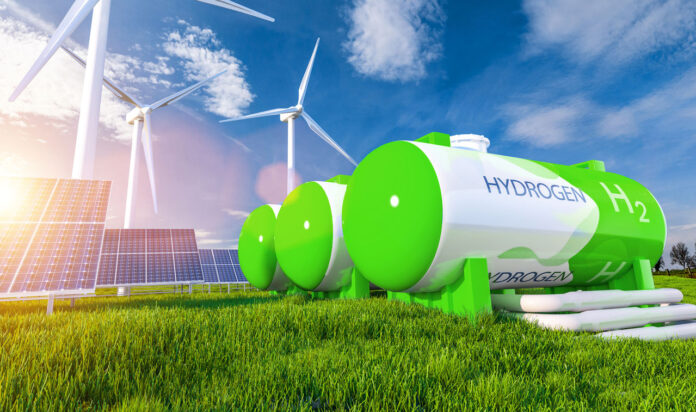A recent study by Akpasi et al. (2025) titled “Hydrogen as a clean energy carrier: advancements, challenges, and its role in a sustainable energy future,” published in Clean Energy, reveals that hydrogen has significant potential as a clean energy carrier, capable of replacing fossil fuels in key industries and supporting the global transition to net zero emissions
“
Hydrogen has significant potential as a clean energy carrier, but its widespread adoption depends on overcoming cost, infrastructure, scalability, and safety challenges.– Akpasi et al. 2025
Hydrogen is emerging as a pivotal clean energy carrier with the potential to replace fossil fuels in the transition to a sustainable energy future. This study explores advancements in hydrogen production, including electrolysis, steam methane reforming, and biomass gasification, with a particular focus on green hydrogen—produced using renewable energy sources like solar and wind—to minimize carbon emissions. It also examines the economic and environmental impact of hydrogen, assessing cost factors and its role in decarbonizing key sectors such as transportation and heavy industry.
Infrastructure and technological challenges are crucial considerations, including the development of safe and efficient storage and distribution systems, as well as the need for supportive policies and international collaboration. Additionally, hydrogen’s role in stabilizing renewable energy grids, enhancing energy security, and promoting sustainable industrial practices highlights its transformative potential in the global energy transition. Looking ahead, the study underscores hydrogen’s significance in achieving net-zero emissions by 2050 and evaluates its feasibility as a large-scale alternative to fossil fuels. By providing a comprehensive review, this research offers valuable insights into hydrogen’s versatility and the ongoing global efforts to integrate it into a low-carbon energy system.
How the Study was Conducted
The study employed a comprehensive review methodology to analyze hydrogen’s role as a clean energy carrier. It encompassed a thorough literature review of existing research reports and case studies on hydrogen production methods, economic and environmental impacts, and technological advancements. Various techniques, including electrolysis, steam methane reforming, and biomass gasification, were compared to assess their efficiency, cost effectiveness, and sustainability.
A comparative analysis was conducted to evaluate different hydrogen production technologies based on key factors such as production rates, carbon emissions, and government funding. Quantitative data analysis helped identify emerging trends and challenges in hydrogen adoption. Additionally, case studies provided insights into real-world applications across industries like transportation, energy storage, and heavy manufacturing.
The study also assessed international policies and strategies supporting hydrogen infrastructure development, examining regulatory frameworks and incentives aimed at accelerating adoption. Furthermore, technological assessments identified barriers and opportunities for scaling up hydrogen production and distribution.
By integrating these methodologies, the study offered a holistic perspective on hydrogen’s potential to drive the energy transition, addressing both opportunities and challenges in its widespread implementation.
What the Authors Found
The authors found that hydrogen has significant potential as a clean energy carrier, capable of replacing fossil fuels in key industries and supporting the global transition to net zero emissions. However, its widespread adoption depends on overcoming challenges related to cost, infrastructure, scalability, and safety, which require technological advancements, government policies, and international collaboration.
Why is this important
Environmental Impact: It highlights hydrogen’s role in reducing greenhouse gas emissions, which is essential for meeting global climate goals like net-zero emissions by 2050.
Energy Transition: Hydrogen can act as a bridge in transitioning from fossil fuels to renewable energy, particularly in hard-to-decarbonize sectors like steel production, aviation, and shipping.
Grid Stability: By storing excess renewable energy, hydrogen helps stabilize energy grids, ensuring a reliable and consistent energy supply.
Economic Opportunities: The adoption of hydrogen technology fosters innovation, creates jobs, and opens new markets, contributing to global economic development.
Global Collaboration: The study emphasizes the importance of international cooperation and supportive policies in scaling hydrogen infrastructure and technology.
What the Authors Recommended
- The authors provided several recommendations to accelerate the adoption of hydrogen as a clean energy carrier and overcome existing challenges:
- Prioritize investment in renewable energy-based hydrogen production methods like electrolysis powered by solar, wind, and hydropower to reduce reliance on fossil fuel-derived hydrogen.
- Develop extensive hydrogen storage and distribution systems, including pipelines and refueling stations, to facilitate its use across industries and transportation.
- Strengthen global partnerships to share technology, knowledge, and resources that promote hydrogen adoption on a larger scale.
- Governments should enact policies and regulations that incentivize hydrogen research, development, and deployment while also addressing safety and cost barriers.
- Prioritize hydrogen applications in sectors like heavy manufacturing, aviation, shipping, and grid stabilization, where decarbonization remains challenging.
- Invest in R&D to improve hydrogen production efficiency, lower costs, and develop scalable technologies and increase awareness of hydrogen’s benefits through educational initiatives, showcasing its role in achieving sustainability goals and addressing climate change.
In conclusion, hydrogen stands at the forefront of the clean energy revolution, offering a viable pathway toward a sustainable, net-zero future. While challenges such as cost, infrastructure, and scalability remain, continued advancements in technology, strategic investments, and international collaboration can accelerate its adoption. By prioritizing green hydrogen production, enhancing storage and distribution systems, and fostering supportive policies, hydrogen can play a transformative role in decarbonizing industries, stabilizing energy grids, and driving economic growth. As the world transitions away from fossil fuels, hydrogen’s versatility and potential make it a critical component in building a cleaner, more resilient global energy system.
















 The African Research (AR) Index is a comprehensive scholarly directory and database focused explicitly on journal publishers that publish and disseminate African research.
The African Research (AR) Index is a comprehensive scholarly directory and database focused explicitly on journal publishers that publish and disseminate African research.

